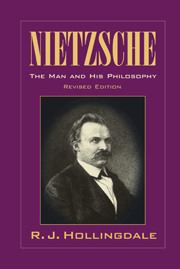Book contents
- Frontmatter
- Contents
- Preface to the Revised Edition
- A List of Nietzsche's Works
- Part I 1844-1869
- Part II 1869-1879
- Part III 1879-1889
- 8 The Turning-Point
- 9 The Wanderer
- 10 Lou Salome
- 11 Zarathustra
- 12 The Solitary
- 13 The Year 1888
- 14 The Revaluation
- 15 The Poet
- 16 The Collapse
- PART IV 1889-1900
- Postscript 1999
- Selective Bibliography
- Index
9 - The Wanderer
from Part III - 1879-1889
Published online by Cambridge University Press: 13 September 2019
- Frontmatter
- Contents
- Preface to the Revised Edition
- A List of Nietzsche's Works
- Part I 1844-1869
- Part II 1869-1879
- Part III 1879-1889
- 8 The Turning-Point
- 9 The Wanderer
- 10 Lou Salome
- 11 Zarathustra
- 12 The Solitary
- 13 The Year 1888
- 14 The Revaluation
- 15 The Poet
- 16 The Collapse
- PART IV 1889-1900
- Postscript 1999
- Selective Bibliography
- Index
Summary
We have left the land and taken to our ship! We have burned our bridges—more, we have burned our land behind us! Now, little ship, take care! The ocean lies all around you; true, it is not always roaring, and sometimes it lies there as if it were silken and golden and a gentle favourable dream. But there will be times when you will know that it is infinite and that there is nothing more terrible than infinity … Alas, if homesickness for land should assail you, as if there were more freedom there—and there is no longer any ‘land’! (FW 124)
'My existence is a fearful burden,'’ Nietzsche wrote to his doctor, Otto Eiser of Frankfort am Main, in January 1880: ‘I should have thrown it off long ago had I not been making the most instructive tests and experiments in the intellectual-moral field precisely in this condition of suffering and almost complete renunciation—this joy in seeking for knowledge carries me to heights where I overcome all torments and all hopelessness. On the whole I am happier than ever before in my life: and yet! continual pain; for many hours of the day a feeling much like seasickness; a semi-paralysis which makes it hard for me to talk, alternating with furious attacks (the last one had me vomiting for three days and nights, I longed for death).'
Three months in Naumburg had worked no improvement, and his idea now was to go south, where the weather was always fine and he could spend most of his waking hours walking—he had still not lost his faith in the curative effect of muscular activity. The only difficulty presented by this plan was that, in his ailing condition, he might need the ministrations of a companion; and it may have been Paul Rée, who paid a long visit to Naumburg in January, who called to mind that Peter Gast was at that time living in Venice. Gast's singular devotion to Nietzsche was well known to their Basel acquaintances, and Rée no doubt felt justified in thinking the faithful Peter the man they were looking for. So it happened that on the 26th Gast received from Rée an unexpected gift of 200 marks, together with a letter telling him what the money was for.
- Type
- Chapter
- Information
- NietzscheThe Man and His Philosophy Revised Edition, pp. 125 - 147Publisher: Cambridge University PressPrint publication year: 1999



